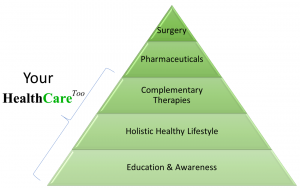Treatment Includes Healthy Diet

Most oncologists have very little interest – let alone training – in nutrition, but have an incredibly engaged audience sitting opposite them, dead keen to hear what they think we should do and eat during treatment.
The general advice of “eat a healthy, balanced diet” is absolutely meaningless for most people, especially if you acknowledge that there is no one-size fits-all approach for diets. If we are getting to the stage of precision and targeted medicine when it comes to carcinogenic agents, then surely we can do better when it comes to personalised nutrition that could help us during treatment? Telling someone to eat plenty of fruit and wholegrains can be interpreted in many ways. For some people, they will think that eating lots of bananas, pineapples, mangoes, grapes, potatoes and wholegrain cereals, pasta and bread is ticking that box of “wholegrains and plenty of fruit and veg”.
Unfortunately, the idea that truly beneficial wholegrain can actually be found in a box of cereal or sliced bread is incorrect. And by lumping fruit and vegetables together, you are dodging the important point that the better source of nutrients and phyto-chemicals comes from vegetables (not including potatoes), herbs, spices, dark and bitter greens and lower sugar fruits, like berries and green apples.
It’s also important to remember how we eat. In Nutritionism, Gyorgy Scrinis (professor of food and nutrition politics and policy at the University of Melbourne) suggests that a common feature of Japanese and Mediterranean diets (often hailed as the healthiest diets to follow) is the lack of processed food and abundance of fresh, natural whole foods, based on local and available produce – focusing on quality, not quantity.
For more information please see the original article: Why the ‘eat a healthy, balanced diet’ advice is meaningless
Our Model




